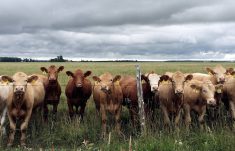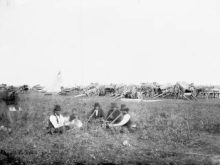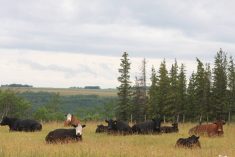Forty-seven years.
Under a plan put forward by the Progressive Conservatives in the waning days of the provincial election, that’s how long it will have taken farmers to get a fairer education tax system.
It was a foundational issue in 1984 when the province’s general farm organization, the Keystone Agricultural Producers, came into being.
To put it into perspective, U.S. President John F. Kennedy promised the U.S. would visit the moon in September of 1962, and just over seven years later, on July 16, 1969, at 8:32 a.m., Neil Armstrong declared it “One small step for a man, one giant leap for mankind.”
Read Also

VIDEO: Manitoba’s Past Lane – Jan. 31
Manitoba, 1946 — Post-war rations for both people and cows: The latest look back at over a century of the Manitoba Co-operator
It will have taken Manitoba nearly seven times as long to adjust how it funds education as it took man to visit another astronomical body.
Even the phase-in period of the proposed plan represents a time lapse nearly double the length of that effort, for what amounts to a rejiggering of revenue flows.
In the meantime, a generation of farmers will have shouldered an unfair portion of the tax burden during this time, a burden that’s only got larger in recent years as farmland values have risen.
As our Allan Dawson reports, that’s costing farmers millions of dollars every year, and will continue to cost them millions as the transition process slowly wends its way along.
University of Manitoba political studies professor, Christopher Adams notes, in our coverage of this story, that the Pallister government has even trod carefully when it comes to characterizing this effort. It’s selling it to voters as a program to reduce property taxes for homeowners, and softpedalling the coincidental reduction in farmland education taxes.
This dovetails well with KAP president Bill Campbell’s op-ed column, where he decries the lack of attention rural issues receive from all parties, in favour of issues that affect urbanites, and especially Winnipeg, where the election is won or lost every time.
One issue he noted was that the results from rural Manitoba are often seen as preordained, and therefore little effort is put into policy for these voters. These so-called ‘yellow dog’ ridings would return the canine in question to Broadway, were that the local Tory candidate.
There’s more than a little truth to that, and it doesn’t just affect rural Manitobans. It affects voters across the country if they become too entrenched.
One example that leaps to mind is Saskatchewan, at the federal level, where it’s been a reliable source of seats for small-c conservative candidates for decades.
Yet under the Stephen Harper government, a promise to amend the federal equalization formula, placing non-renewable resources like oil and gas outside the calculations, was dropped after the election, costing our next-door neighbour $800 million a year.
It wasn’t much of a reward for the ongoing loyalty voters in that province have shown the Conservative brand.
It’s said the squeaky wheel gets the grease, and in the case of politics it’s the voter that’s willing to change who gets their ballot that gets the attention of politicians. Reliable safe seats, on the other hand, get ignored as the crucial swing voter is courted.
Years ago, while working for a different organization, I met some Saskatchewan farmers at the airport and was delivering them to a downtown meeting. Along the way they marvelled at all the large public construction projects, many at least partially funded by the federal government.
One farmer wondered aloud why Winnipeg was getting so much federal money while Saskatchewan wasn’t. I responded, “Probably because voters here have shown they will switch back and forth between the Conservatives and Liberals, so they get paid attention to.”
This is perhaps how politics works, but that doesn’t make it right. Voters should expect better than self-serving self-interest on the part of their elected representatives. And they certainly shouldn’t be taken for granted.
Provincially, however, there needs to be credible alternatives, and here the challengers simply didn’t step up to the plate. If you’ve been watching our coverage you might think the Co-operator was tacitly endorsing the PCs, since we ran so many stories about their promises.
But in fact, they were the only party even paying meaningful lip service to rural issues. The NDP, largely seen as the most credible challenger, was all but silent.
That’s a sad state of affairs for the party of Bill Uruski, Leonard Harapiak and Rosann Wowchuk, all NDP agriculture ministers who understood the importance of the sector.
Regardless who won the election, held just after our Sept. 12 issue went to press, rural Manitobans deserved better.
If our political parties don’t understand that, rural voters will need to make them understand.















